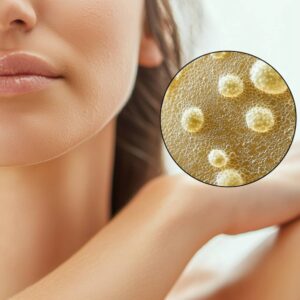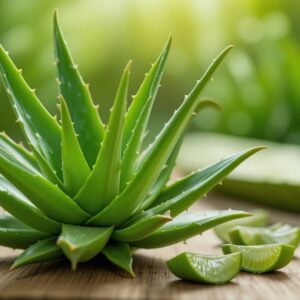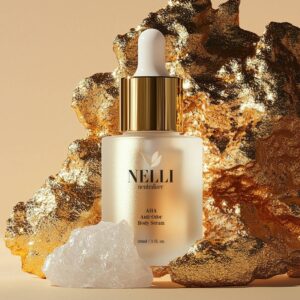
As someone who has spent the better part of a decade interrogating ingredient labels and side-eyeing beauty myths, I’ve seen every buzzword from “clean beauty” to “all-natural miracles.” But nothing stirs my intellectual curiosity like the science-backed elegance of exfoliating acids. Today, we’re diving into the AHA vs BHA debate—not just for glowing skin, but for a lesser-discussed benefit: odor control. Yes, acids aren’t just for your face; they can revolutionize your underarm game.
Table of Contents
AHA vs BHA: What’s the Difference?
Let’s start with the basics. AHA (Alpha Hydroxy Acids) and BHA (Beta Hydroxy Acids) are both exfoliants, but their properties and mechanisms of action differ.
Here’s a list of the different AHAs and BHAs used in skincare, along with their common sources and main benefits:
✅ Alpha Hydroxy Acids (AHAs)
AHAs are water-soluble acids derived from fruits, milk, or sugar; they exfoliate the skin’s surface.
| AHA | Source | Main Benefit |
|---|---|---|
| Glycolic Acid | Sugarcane | Smallest molecule; penetrates deeply; brightens, smooths fine lines |
| Lactic Acid | Milk, fermented vegetables | Gentler; improves hydration; good for sensitive skin |
| Mandelic Acid | Bitter almonds | Large molecule; gentlest AHA; good for acne-prone/sensitive skin |
| Citric Acid | Citrus fruits | Mild exfoliation; antioxidant properties; pH adjuster |
| Malic Acid | Apples, pears | Mild exfoliation; often combined with stronger AHAs |
| Tartaric Acid | Grapes, tamarind | Mild exfoliation; antioxidant; stabilizes other AHAs |
✅ Beta Hydroxy Acids (BHAs)
BHAs are oil-soluble acids, making them ideal for penetrating pores and controlling excess oil.
| BHA | Source | Main Benefit |
|---|---|---|
| Salicylic Acid | Willow bark, wintergreen | Penetrates pores; exfoliates inside the pore; reduces blackheads/acne |
| Betaine Salicylate | Sugar beet + salicylic acid | Gentler alternative to salicylic acid; less irritating |
| Tropic Acid | Plant-derived | Less commonly used; similar action to salicylic acid |
👉 Key difference:
- AHAs → best for surface exfoliation, hydration, fine lines, dullness
- BHAs → best for oily, acne-prone skin, clogged pores
AHAs are water-soluble, working on the skin’s surface to exfoliate dead skin cells, improve texture, and brighten. BHAs, being oil-soluble, penetrate deeper into pores to unclog sebum and debris. Both acids reduce the pH of the skin, creating an environment hostile to odor-causing bacteria.
AHA vs BHA: Which Acid is Best for Odor Control?
AHA for Odor Control
For those who experience body odor from dry, rough, or sun-damaged skin, AHA can be a powerful ally. AHA acids work by exfoliating the surface layer of your skin, promoting skin renewal and hydration — two essential factors when it comes to keeping odor at bay. Dead skin cells that aren’t regularly sloughed off can trap sweat and bacteria, leading to unpleasant smells. By using AHA-based deodorants, you can help ensure your skin stays smooth, even, and ready to handle sweat naturally.
- Best for dry, flaky, or uneven skin
- Helps to prevent odor buildup caused by dead skin
- Hydrates and brightens skin for a fresher, healthier appearance
In a product like Nelli Neutralizer Anti-Odor Serum, glycolic acid and lactic acid are combined to provide gentle exfoliation, leaving the skin clean, balanced, and free from the buildup of bacteria that contribute to body odor.
BHA for Odor Control
On the other hand, BHA, specifically salicylic acid, excels at penetrating deep into pores and clearing out trapped oils and bacteria. For those with oily or acne-prone skin, BHA helps control excess sweat and oil, which are the prime ingredients for odor-causing bacteria to thrive. By keeping your pores clear, BHA ensures that bacteria don’t have a chance to accumulate and cause unwanted smells.
- Best for oily or acne-prone skin
- Penetrates pores to fight odor caused by trapped sweat and bacteria
- Anti-inflammatory properties help soothe sensitive skin
In deodorants, BHA can be an excellent addition for individuals who want to target odor directly at the source, keeping the underarms and other sweat-prone areas clear and fresh.
AHA vs BHA: Combine Both for Maximum Odor Control
The truth is, AHA vs BHA doesn’t have to be an either/or choice — in fact, using both acids in the right ratios can provide maximum odor control. The combination of glycolic acid, lactic acid, and salicylic acid can help exfoliate the surface of the skin, cleanse the pores, and reduce the bacteria that cause body odor, all while allowing the body to sweat naturally.

Products like Nelli Neutralizer Anti-Odor Serum leverage this synergistic blend, combining these powerhouse acids to address both surface exfoliation and deeper pore cleansing. This revolutionary formula not only provides long-lasting freshness but also allows your skin to breathe and sweat naturally, without the risk of blocking sweat glands, unlike traditional aluminum-based deodorants.
Why Traditional Deodorants Fall Short
Most deodorants mask odor or block sweat with aluminum-based antiperspirants. The problem? Aluminum plugs sweat glands, interfering with natural detoxification—and for many, causing irritation or worsened odor over time. In contrast, AHA vs BHA-based odor control addresses the root cause without occlusion.
The Nelli Neutralizer Anti-Odor Serum lets you sweat naturally while keeping you fresh—lasting all day in hot, humid climates, through extreme sports, or even for those with hyperhidrosis. It’s not hyperbole; it’s science.
AHA vs BHA: Who Should Use Which Acid?
AHA vs BHA For Women:
Women often experience odor linked to hormonal shifts, shaving-induced irritation, or bacterial imbalance. AHAs like Lactic Acid and Glycolic Acid gently exfoliate and maintain skin hydration while suppressing bacterial overgrowth—ideal for delicate underarm skin.
AHA vs BHA For Men:
Men, particularly those with thicker underarm hair and more active sebaceous glands, may benefit more from the pore-penetrating power of Salicylic Acid (BHA) to clear buildup and prevent clogged follicles that can trap odor-causing bacteria.
But again, why pick one when you can have both? The magic is in the synergy.

The Supporting Cast: Hydrating and Antimicrobial Allies
While acids do the heavy lifting, Nelli Neutralizer Anti-Odor Serum isn’t just a cocktail of exfoliants. In addition to AHA vs BHA, there are other ingredients that work together to elevate odor control. For example, Nelli Neutralizer Anti-Odor Serum combines the following key ingredients:
- Tea Tree Leaf Water: antimicrobial and calming
- Aloe Vera Leaf Water: soothes and hydrates
- Sodium Hyaluronate: locks in moisture
- Dipotassium Glycyrrhizate: anti-inflammatory and skin-calming
- Sclerotium Gum & Xanthan Gum: enhance texture and skin barrier support
- Gluconolactone: A gentle exfoliant (PHA) that helps maintain hydration levels while providing anti-aging benefits.
Together, these ingredients buffer the exfoliating acids, preventing irritation while enhancing efficacy.

Intelligent Delivery: The Secret Weapon
Of course, no formula can shine without a smart delivery system. That’s where Dimethyl Isosorbide and Ethoxydiglycol come in—two brilliant penetration enhancers that ferry actives deep into the skin, ensuring that every drop of acid works harder, longer, and stays potent throughout the day.
AHA vs BHA: The Verdict for Odor Control
After exploring AHA vs BHA from every angle, one truth is clear: combining both acids in the right ratio outperforms either alone. This is the innovation behind Nelli Neutralizer Anti-Odor Serum—a sophisticated blend designed to keep you odor-free without aluminum, without masking, and without compromise.
In a world obsessed with “natural,” we’re often told that simplicity equals safety. But when it comes to odor control, the elegant complexity of a well-balanced acid blend—scientifically formulated, intelligently delivered—is what truly sets you free.
So next time you ponder AHA vs BHA, remember: the answer isn’t either-or; it’s both, in perfect synergy. And your underarms? They deserve nothing less.




